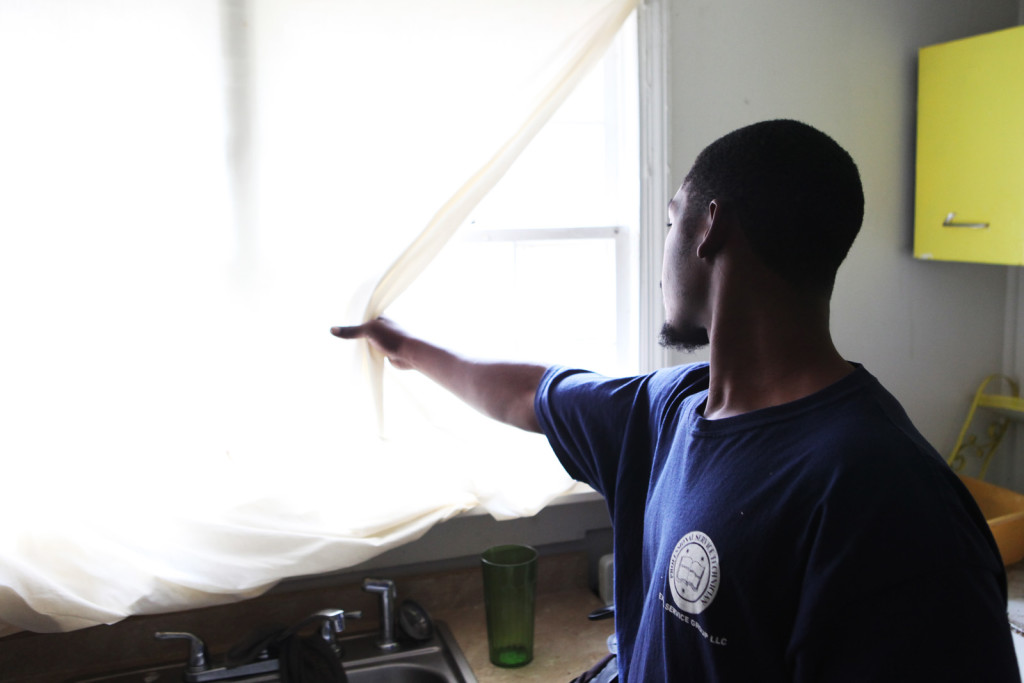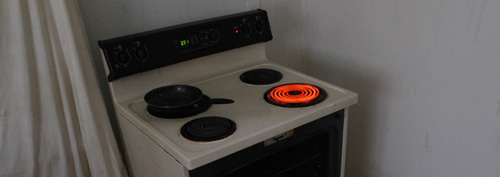
This story was my last investigation for The News & Observer. It began late in 2014, when Renee Pinkney showed me evidence that her son, Dontay Jones, was living in unacceptable conditions. Jones has a disability and is a “ward” of Wake County, meaning the government is his legal guardian. Thanks to his mother’s diligent efforts, we were able to show that he lived for months without proper heat. The article prompted outrage from county leaders, who promised reform. The photograph is by me.
RALEIGH The spiral of a stove-top coil burned orange in Dontay Jones’ darkened kitchen.
The 22-year-old had turned the stove’s dial to high two days earlier, as a week of cold weather took hold late in January. The appliance was the main source of heat for the East Raleigh cottage.
Jones, who has a mental illness, had lived in the ramshackle house for three months, along with another person with a mental illness. His guardian – the body responsible for his living situation – is the government of Wake County.
There are 5,261 adults in North Carolina who have a government employee as a guardian. Wake County is responsible for the finances and general well-being of about 520. The courts have declared them incompetent to make their own life decisions, often owing to mental illness or age. Yet there are few guarantees and little accountability for the conditions in which Dontay Jones and other wards of North Carolina’s governments live.
While the majority of Wake County’s wards live in supervised group settings, some have gone homeless. Others have lived in substandard housing. In all, Jones stayed about five months in the ramshackle house on Lane Street, his federal disability benefits paying his $500 share of the rent.
On that January day, the stove’s warmth leaked out through the kitchen’s broken, taped-over window. In the hall, a mid-20th century heater sat dark and useless.
Restrictive public-records laws make a full accounting of Jones’ situation difficult, but this much is apparent: Jones and his housemate lived through the dead of winter under Wake County’s supervision, and no one turned the heat on.
At best, parts of the house were warmed by space heaters, which were not provided by the government or its contractors, said Jones’ mother, Renee Pinkney.
Jones’ story illustrates the difficulties that Wake County faces in finding proper housing for its wards. Governments have few resources, compared with the demand for housing and mental health care, and few private landlords accept these would-be tenants, who often carry criminal records and depend on public assistance.
Yet Wake County, like local governments across the state, has few safeguards for the housing of vulnerable people.
The county has no minimum standards for the private properties where it houses people under its guardianship, said county spokesman Eric Curry. Guardians aren’t required to inspect the homes rented for their wards, and the county publishes no regular reports or detailed information about the housing situations of people under its guardianship.
In response to the reporting of this article, county staffers say they are working to create and uphold standards for the housing of people under its guardianship.
It will not be easy. The number of wards of the county has increased steadily since the state introduced dramatic changes to the mental-health system a decade ago, and Raleigh’s rapid development has cut into supplies of affordable housing.
“Lack of adequate affordable housing is a very common problem for our clients, and I think you’ll find that people with serious mental illness are among the most vulnerable to homelessness,” said Corye Dunn, director of public policy for Disability Rights N.C., a nonprofit that provides legal services for people with disabilities.
“I know I can live better than this,” Jones said one day.
Government guardian
The young man fumbled through the kitchen’s shadows, opening empty cabinets and a dark refrigerator.
“I use the light from my phone to cook in here, when I’ve got something,” Jones said, lifting the plastic from a window to let more streetlight in.
His doctors have diagnosed him with bipolar-type schizoaffective disorder, a condition that can create hallucinations and delusions, sometimes leading people into lonely and troubled lives.
Jones lost the rights that many adults have in a court hearing just before he turned 19. His mother would remain his guardian for four years, until a clerk of court ruled last summer that she had abandoned him at a psychiatric hospital at the end of his stay. Pinkney said she was fighting at the time for Jones to be placed in appropriate housing.
Together, they’ve been in and out of courtrooms for years, to manage both his living situation and a series of criminal charges. He faces pending charges that he committed attempted aggravated rape and felony assault in 2007 at age 15, when the steps began that led to his diagnosis.
Jones is accused of hitting a woman in the head with a five-pound barbell, according to media reports. His pro bono attorney, Mike Whalen, contends that the incident was linked to Jones’ illness and that the attempted-rape charge stemmed from an untrue, coerced confession to police.
Today, Pinkney remains part of her son’s life – but Jones’ affairs are officially managed by a series of government agencies and for-profit assistance companies.
The chain starts with the federal government, which provides about $720 per month for his rent and expenses. That money flows into an account managed by his public guardian, Stephanie Williams, who is responsible for dozens of people with disabilities. Williams and other public guardians work with Wake County Human Services.
Each month, Williams sends the money on to other organizations and individuals for rent, transportation and other services for Jones.
State law makes it clear that as guardian, the county government has the legal authority and responsibility to choose where Jones lives, to ensure his education and comfort, and even to decide whether he should be resuscitated in a medical emergency.
“The guardian has a duty to make the best decisions he can for the ward so that the ward’s life is as comfortable, healthy and safe as possible,” according to the N.C. Division of Aging and Adult Services’ website.
Failed inspection
A city of Raleigh housing inspector came to visit Jones’ house in November, at his mother’s request.
The inspector found 23 instances where the place fell short of city code, according to a letter the city sent to the building’s owner, Jared Burnette, of Apex. Burnette was told to make the heat work, install carbon monoxide detectors, repair the broken windows and fix the leaking sink, among other items.
Over the next few months, Jones said he saw less and less of his guardian, Williams, and contract health providers. He said he stopped taking his medication. His mother has photographs of full packages of drugs with his name on them.
Jones was evicted late in February. The city had not declared the housing violations resolved.
Williams deferred all comment to the county’s attorneys. Champion Healthcare and Building Beyond, two related companies involved, have refused to comment, citing privacy concerns.
The county has no documents regarding the condition of the home when Jones arrived. Burnette claims the house was originally in good shape. He suspects, he said, that Jones damaged the apartment as part of a plot against the county.
“When you rent these lower-income type rental properties, people just do all sorts of stuff to the properties. They try to intimidate, and they try to mess stuff up, and they try to call reporters and call the city,” he said.
He didn’t make repairs, despite the inspector’s report, because he thought the house would only be damaged again.
“I’m worried about spending $800 to fix the window, fix the plumbing, and go out and find it’s trashed the next day,” he said.
Burnette leases several properties for the housing of people deemed incompetent and claims they have had no problems with his rentals. City inspectors have, however, cited numerous housing violations at several of Burnette’s properties.
Burnette owns or co-owns 50 local properties besides his home in Apex, almost all of them spread across Southeast Raleigh, according to Wake County property records.
In the past two years, city inspectors have cited housing violations at seven of those properties, including Jones’ residence. It’s not clear who was living in them at the time. The problems involved electrical work, building materials, heating and cooling systems, and missing smoke or carbon-monoxide detectors, among other issues, according to public records.
Only one of the properties’ issues have been fully resolved, according to city records.
Living conditions vary
Despite his landlord’s arguments, one claim from the city inspector’s report could not be Jones’ fault: There was no active gas service to the building’s heater. Jones doesn’t have photo identification, much less the ability to start an account for himself.
Craig Burrus, manager of senior and adult services for Wake County, said that Wake County’s wards live in a variety of conditions. In some cases, the county can’t find housing at all.
“I think anything is possible, but if we were paying a landlord for an apartment or a room, I think we have an expectation that there would be heat,” he said. “A space heater, that would be more of an emergency-type situation, or supplemental.”
It is difficult to say how many wards of Wake County might be living in substandard housing. The county does not publish any routine assessment of its wards’ living conditions. It also will not release the names of landlords, nor the addresses where wards have lived, citing a state law that prohibits the release of information that could identify people receiving certain types of public assistance.
There are relatively few units dedicated to affordable housing in Wake County, and fewer still for people with disabilities of any kind. Instead, the county often searches for housing on the open market, where it must negotiate with rising rents and reluctant landlords, who might reject applicants with criminal records.
“You put them in the best setting that you can, and (where) you think they’ll stay,” Burrus said. “You try to get the services in place to support them in that environment.”
Burrus estimates that about 80 percent of the county’s wards live in a facility, such as a nursing home or an assisted-living organization. Wake inspectors visit these facilities several times per year, checking to see how wards are fed and cared for, and seeing that state protocols are enforced.
The county also tries to examine the housing where wards live independently, but there’s no checklist or requirement, Burrus said.
Wake County now is working to institute a more formal way to assess housing, according to Robert Sorrels, deputy director for human services.
“The state has not provided a protocol or a tool to do that work. We have talked amongst ourselves, that we would like to institute something, and we intend to,” he said. “But we also intend to share what we plan to do with the state, so we’re not being rogue or out of compliance.”
Holes in the net
New rules, however, may close only part of the gap.
Dunn, of Disability Rights, said that it would not be surprising for poor living conditions to go unnoticed. While the law sets the guardian as the responsible party, public guardians often are working with huge caseloads, she said.
In Wake County, a dozen guardians are responsible for up to 50 wards each.
In the past, Dunn said, the government staff would have had more help. Before the mental-health reforms of the early 2000s, a force of case managers worked specifically to check that appropriate services were provided to each person in need.
“The functions that used to be called case management … are more and more falling to the guardian, and that’s not actually what we pay our departments of social services to do,” Dunn said.
Case managers “weren’t at every appointment holding hands, but they were generally ensuring the appropriateness of services. So that function doesn’t really exist in our current system – and that’s a really big part of what’s going wrong.”
Back at home
After his eviction, Jones moved back into his mother’s house in Garner. He had stayed there on many cold days through the winter but hadn’t lived there full-time for nearly a year.
Pinkney was wary of taking her son back. He needs to be watched, she said, or he might go back to stealing from the house.
She also couldn’t reach an agreement with Williams, the guardian, about how Jones’ disability income would be spent. Pinkney wanted more than $600 of the monthly check to ensure, she said, she could keep Jones fed and supervised. Williams would give only $500, Pinkney said.
Unwilling to accept the offer, which she describes as “giving in to a bully,” Pinkney says she’s getting nothing. She’s still pushing her case to win back guardianship, even as her finances dip into the red. But she sees progress, too, in the son who, she said, was a member of the National Honor Society and persevered to graduate from Middle Creek High School in 2013.
The former all-conference pole vaulter, who also played football and basketball, spends his days exercising, working and smoking cigarettes on the porch. He cuts the lawn. He leaves sometimes, his mother unsure where he could be. But Jones isn’t stealing from her anymore. They’re rebuilding their trust.
“I don’t play,” she said one recent afternoon. “I’ve got rules.”
As a child, he was an “All-American kid, your dream child, for real,” his mother said.
She wants him to go to school. He’s set on the Olympics.
“I feel comfortable. I feel peaceful,” he said.


